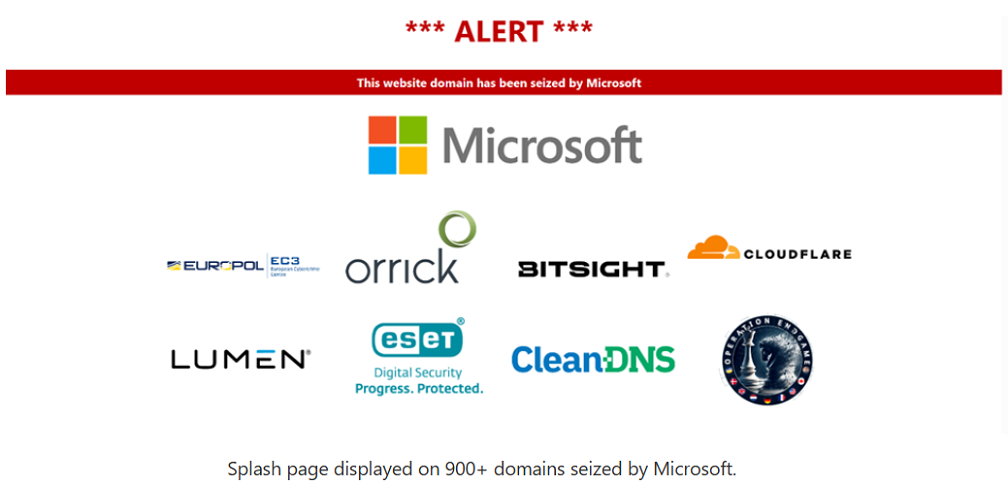Disrupting Lumma Stealer: Microsoft leads global action against favored cybercrime tool

Microsoft’s Digital Crimes Unit (DCU) and international partners including Europol announced that are disrupting the leading tool used to indiscriminately steal sensitive personal and organizational information to facilitate cybercrime.
On Tuesday, May 13, Microsoft’s DCU filed a legal action against Lumma Stealer (“Lumma”), which is the favored info-stealing malware used by hundreds of cyber threat actors. Lumma steals passwords, credit cards, bank accounts, and cryptocurrency wallets and has enabled criminals to hold schools for ransom, empty bank accounts, and disrupt critical services.
Via a court order granted in the United States District Court of the Northern District of Georgia, Microsoft’s DCU seized and facilitated the takedown, suspension, and blocking of approximately 2,300 malicious domains that formed the backbone of Lumma’s infrastructure.
The Department of Justice (DOJ) simultaneously seized the central command structure for Lumma and disrupted the marketplaces where the tool was sold to other cybercriminals. Europol’s European Cybercrime Center (EC3) and Japan’s Cybercrime Control Center (JC3) facilitated the suspension of locally based Lumma infrastructure.
Between March 16, 2025, and May 16, 2025, Microsoft identified over 394,000 Windows computers globally infected by the Luma malware. Working with law enforcement and industry partners, we have severed communications between the malicious tool and victims.

Moreover, more than 1,300 domains seized by or transferred to Microsoft, including 300 domains actioned by law enforcement with the support of Europol, will be redirected to Microsoft sinkholes. This will allow Microsoft’s DCU to provide actionable intelligence to continue to harden the security of the company’s services and help protect online users.
These insights will also assist public- and private-sector partners as they continue to track, investigate, and remediate this threat. This joint action is designed to slow the speed at which these actors can launch their attacks, minimize the effectiveness of their campaigns, and hinder their illicit profits by cutting a major revenue stream.
The Head of Europol’s European Cybercrime Centre, Edvardas Šileris, said: “This operation is a clear example of how public-private partnerships are transforming the fight against cybercrime. By combining Europol’s coordination capabilities with Microsoft’s technical insights, a vast criminal infrastructure has been disrupted. Cybercriminals thrive on fragmentation – but together, we are stronger.”
What is Lumma?
Lumma is a Malware-as-a-Service (MaaS), marketed and sold through underground forums since at least 2022. Over the years, the developers released multiple versions to continually improve its capabilities. Microsoft Threat Intelligence shares more details around the delivery techniques and capabilities of Lumma in a recent blog.
Lumma, the world’s largest infostealer, was a sophisticated tool that enabled cybercriminals to collect sensitive data from compromised devices on a massive scale. Stolen credentials, financial data, and personal information were harvested and sold through a dedicated marketplace, making Lumma a central tool for identity theft and fraud worldwide.
The Lumma marketplace operated as a hub for buying and selling the malware, providing criminals with user-friendly access to advanced data-stealing capabilities. Its widespread use and accessibility made it a preferred choice for cybercriminals looking to exploit personal and financial data.
Typically, the goal of Lumma operators is to monetize stolen information or conduct further exploitation for various purposes. Lumma is easy to distribute, difficult to detect, and can be programmed to bypass certain security defenses, making it a go-to tool for cybercriminals and online threat actors, including prolific ransomware actors such as Octo Tempest (Scattered Spider). The malware impersonates trusted brands, including Microsoft, and is deployed via spear-phishing emails and malvertising, among other vectors.
For example, in March 2025, Microsoft Threat Intelligence identified a phishing campaign impersonating online travel agency Booking.com. The campaign used multiple credential-stealing malware, including Lumma, to conduct financial fraud and theft. Lumma has also been used to target gaming communities and education systems and poses an ongoing risk to global security, with reports from multiple cybersecurity companies outlining its use in attacks against critical infrastructure, such as the manufacturing, telecommunications, logistics, finance, and healthcare sectors.
Dariusz Mazurkiewicz – CEO at BLIK Polish Payment Standard
Banking 4.0 – „how was the experience for you”
„To be honest I think that Sinaia, your conference, is much better then Davos.”
Many more interesting quotes in the video below:










